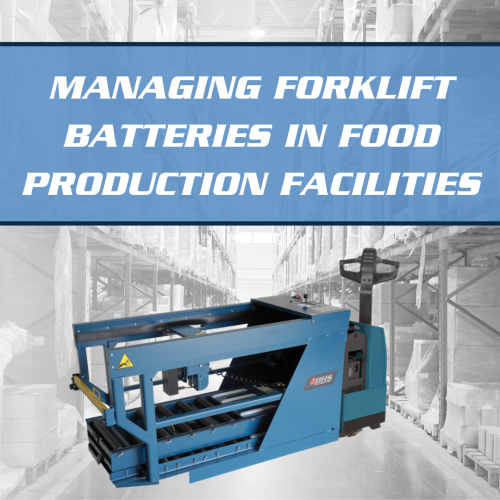We use cookies to make your experience better. To comply with the new e-Privacy directive, we need to ask for your consent to set the cookies. Learn more.
Managing Forklift Batteries in Food Production Facilities

If you use forklifts in a food production capacity, odds are those trucks are electric. Electric lift trucks run cleaner and don’t release emissions, making them ideal for the super-clean, hazard-sensitive nature of a food production facility.
Of course, while electric forklifts won’t leak oil or leave a layer of soot on the machinery, forklift batteries do sometimes leak. Electrolyte is not a substance you want anywhere near a food product.
With a little bit of maintenance work and a strong battery handling plan, you can get the most out of an electric forklift fleet without running the risk of an electrolyte spill or other battery-related accident. Here are a few ways to keep batteries in their cleanest, most productive state for use in the food production industry:
- Outfit battery handling equipment for cold storage use. Driving trucks in and out of cold storage areas can create condensation, which makes it more dangerous to remove and replace forklift batteries. The ideal extractor arm for the cold, therefore, uses a vacuum attachment to secure to the battery’s case.
Occasionally, you may need to remove batteries from stalled-out lift trucks located in refrigerated aisles. In addition to your bulk battery handling system, it is wise to keep a mobile Automatic Transfer Carriage (with vacuum extraction) onsite for in-place battery changes.
- Optimize battery use with Battery Fleet Management systems. Operate a forklift battery in the cold and you’ll have to contend with reduced capacity. The best way to protect forklift batteries in cold storage applications is to both discharge and charge them fully on each use.
When forklift operators eyeball their battery picks, though, they may end up short-cycling batteries without even realizing they’re doing it. That can cause long-term damage to battery cells. A fleet management tool like Fleet TrackerTM or Next Available Battery provides detailed information about battery states of charge. Fleet Tracker also generates useful reports on battery use and tracks maintenance schedules.
- Integrate battery wash equipment into your main battery change-out stations. Material handling equipment in food processing applications has to be completely clean, and that includes forklift batteries. Keeping industrial batteries free of electrolyte build-up will also prevent self-discharge and extend the working life of each unit. In order to keep up with aggressive washing schedules, make Battery Wash Cabinets part of your battery charging line. That way, you can handle the battery with the same equipment you use for daily change-outs.
- Reduce change-out time as much as possible. Food must move quickly; the sooner it gets shipped, the fresher the product. Cut down on stray material handling time by choosing Operator Aboard Battery Extractors for your main change system. These machines reduce change-out time to just a few minutes.
Clean, efficient forklift batteries contribute to a lean material handling system at every step of the food supply chain. While the above recommendations were designed for food production facilities in particular, they’re just as valid in cold storage warehouses, food product distribution centers, and big box grocery retailers.
No matter where you’re handling pallet-loads of food products, forklift batteries are likely to be at the heart of your operation. Keep them clean and well-managed to reduce costs and improve safety across the board.
